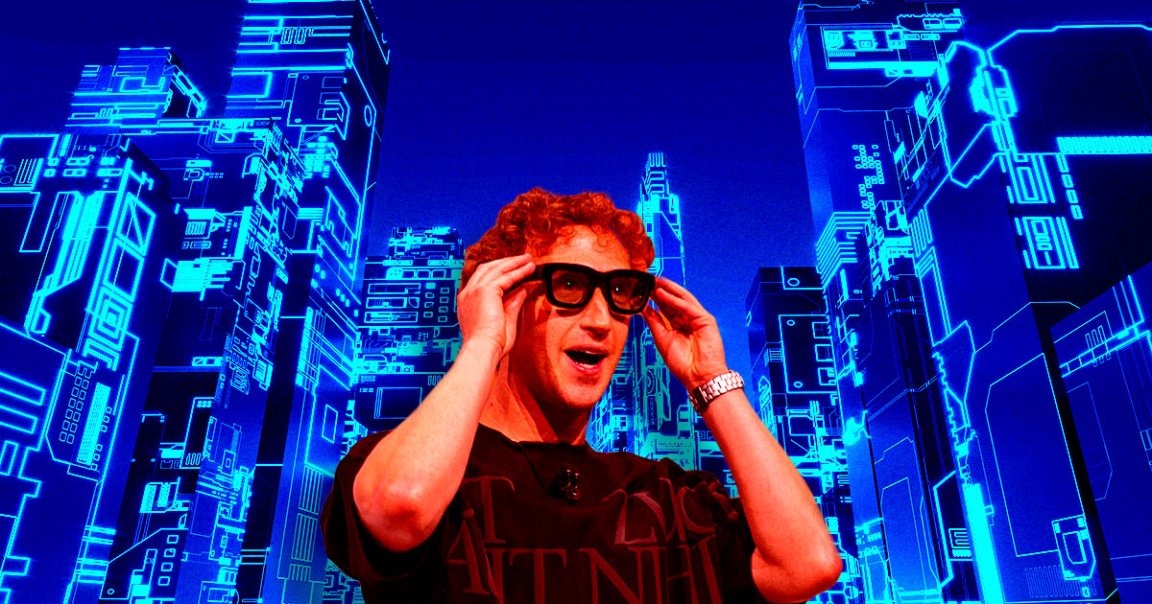
This week, Meta CEO Mark Zuckerberg shared his vision for the future of AI, a “personal intelligence” that can help you “achieve your goals, create what you want to see in the world, experience any adventure, be a better friend to those you care about, and grow to become the person you aspire to be.”
The hazy announcement — which lacked virtually any degree of detail and smacked of the uninspired output of an AI chatbot — painted a rosy picture of a future where everybody uses our “newfound productivity to achieve more than was previously possible.”
Zuckerberg couched it all in a humanist wrapper: instead of “automating all valuable work” like Meta’s competitors in the AI space, which would result in humanity living “on a dole of its output,” Zuckerberg argued that his “personal superintelligence” would put “power in people’s hands to direct it towards what they value in their own lives.”
But it’s hard not to see the billionaire trying to have it both ways. Zuckerberg is dreaming up a utopia in which superintelligent AIs benevolently stop short of taking over everybody’s jobs, instead just augmenting our lives in profound ways.
The problem? Well, basic reality, for starters: if you offer a truly superintelligent AI to the masses, the powerful are going to use it to automate other people’s jobs. If you somehow force your AI not to do that, your competitors will.
As former OpenAI safety researcher Steven Adler pointed out on X-formerly-Twitter, “Mark seems to think it’s important whether Meta *directs* superintelligence toward mass automation of work.”
“This is not correct,” he added.”If you ‘bring personal superintelligence to everyone’ (including business-owners), they will personally choose to automate others’ work, if they can.”
Adler left OpenAI earlier this year, tweeting at the time that he was “pretty terrified by the pace of AI development these days.”
“IMO, an AGI race is a very risky gamble, with huge downside,” he added, referring to OpenAI CEO Sam Altman’s quest for “artificial general intelligence,” a poorly-defined point at which the capabilities of AIs would surpass those of humans. “No lab has a solution to AI alignment today. And the faster we race, the less likely that anyone finds one in time.”
Adler saw plenty of parallels between his former employer’s approach and Zuckerberg’s.
“This is like when OpenAI said they are only building AGI to complement humans as a tool, not replace them,” he tweeted this week. “Not possible! You’d at minimum need incredibly restrictive usage policies, and you’d just get outcompeted by AI providers without those restrictions.”
Zuckerberg is pouring a staggering amount of resources into his vision for Superintelligence, spending billions of dollars on talent alone. The company is allocating tens of billions on top of that for enormous AI infrastructure buildouts.
What humanity will get in return is a “personal superintelligence” that frees up our time enough to look at the world through rose-tinted glasses — in a quite literal way, according to Zuckerberg.
In his announcement, the millennial tech founder suggeseted that “personal devices like glasses” will “become our primary computing devices” to reap the “benefits of superintelligence.”
That vision had certain observers wondering: that’s it?
“I think the most interesting thing about Zuck’s vision here is how… boring it is,” journalist Shakeel Hashim tweeted. “He suggests the future with *superintelligence* will be one with glasses — not nanobots, not brain-computer interface, but glasses.”
“Just entirely devoid of ambition and imagination,” he added.
The CEO’s underwhelming vision of the future certainly echoes those of his peers. Altman has previously described a utopian society in which “robots that use solar power for energy can go and mine and refine all of the minerals that they need,” all without requiring the input of “human labor.”
Anthropic CEO Dario Amodei, meanwhile, described “machines of loving grace” that “could transform the world for the better.”
“I think that most people are underestimating just how radical the upside of AI could be,” he wrote in a blog post last year, “just as I think most people are underestimating how bad the risks could be.”
Of course, there’s a nearly trillion-dollar incentive to sell investors on these kinds of lofty, utopian daydreams.
But to critics who aren’t buying into these visions, the risks are considerable, leaving the possibility of mass unemployment and a collapse of society as the machines render us obsolete. Profit-maximizing CEOs will have no choice but to appease investors by replacing as much human labor as possible with AI.
The real question: will they pull it off, or are they hitting a wall?
More on Zuckerberg’s vision: Mark Zuckerberg Looks Like He’s Been Taken Hostage as He Explains Plan for Deploying AI Superintelligence